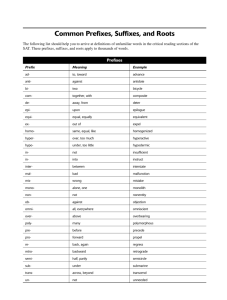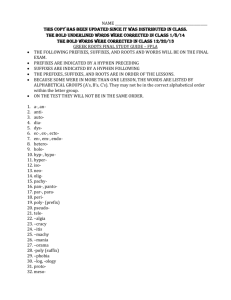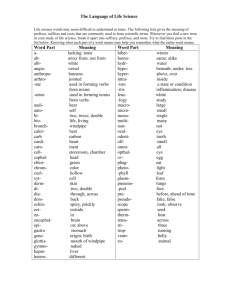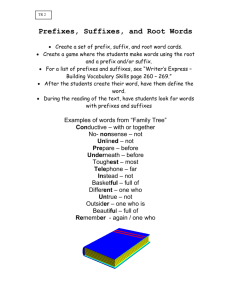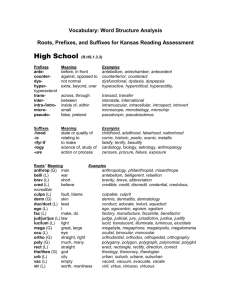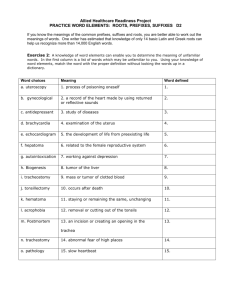Knowing the Roots
advertisement
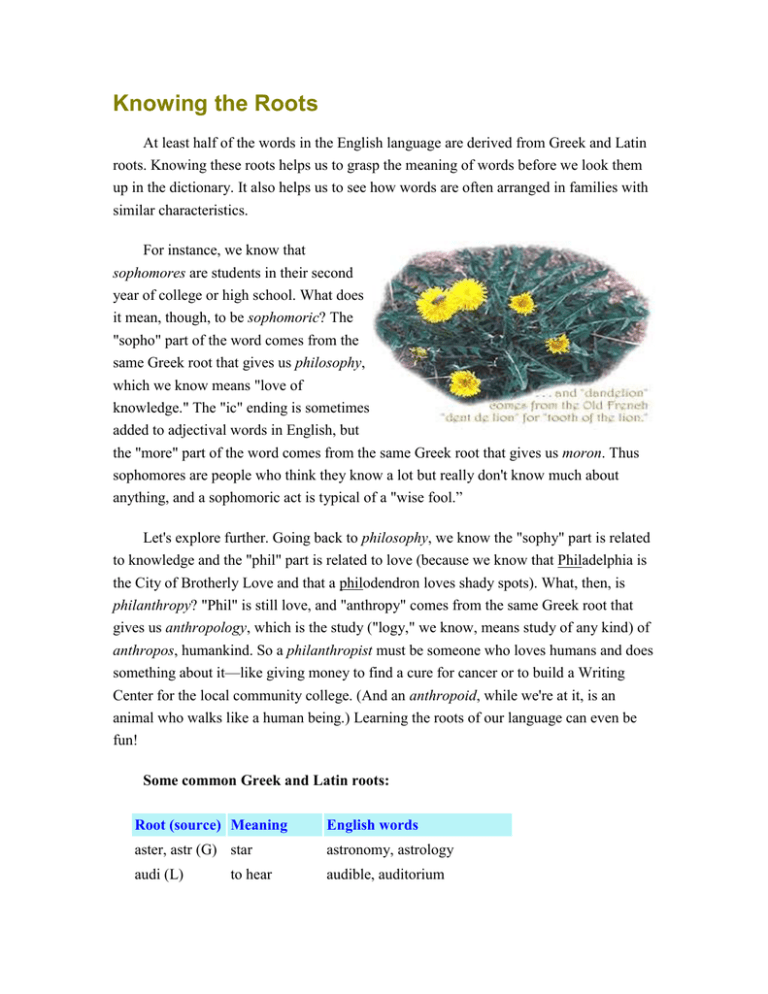
Knowing the Roots At least half of the words in the English language are derived from Greek and Latin roots. Knowing these roots helps us to grasp the meaning of words before we look them up in the dictionary. It also helps us to see how words are often arranged in families with similar characteristics. For instance, we know that sophomores are students in their second year of college or high school. What does it mean, though, to be sophomoric? The "sopho" part of the word comes from the same Greek root that gives us philosophy, which we know means "love of knowledge." The "ic" ending is sometimes added to adjectival words in English, but the "more" part of the word comes from the same Greek root that gives us moron. Thus sophomores are people who think they know a lot but really don't know much about anything, and a sophomoric act is typical of a "wise fool.” Let's explore further. Going back to philosophy, we know the "sophy" part is related to knowledge and the "phil" part is related to love (because we know that Philadelphia is the City of Brotherly Love and that a philodendron loves shady spots). What, then, is philanthropy? "Phil" is still love, and "anthropy" comes from the same Greek root that gives us anthropology, which is the study ("logy," we know, means study of any kind) of anthropos, humankind. So a philanthropist must be someone who loves humans and does something about it—like giving money to find a cure for cancer or to build a Writing Center for the local community college. (And an anthropoid, while we're at it, is an animal who walks like a human being.) Learning the roots of our language can even be fun! Some common Greek and Latin roots: Root (source) Meaning English words aster, astr (G) star astronomy, astrology audi (L) audible, auditorium to hear bene (L) good, well benefit, benevolent bio (G) life biology, autobiography dic, dict (L) to speak dictionary, dictator fer (L) to carry transfer, referral fix (L) to fasten fix, suffix, affix geo (G) earth geography, geology graph (G) to write graphic, photography jur, just (L) law jury, justice log, logue (G) word, thought, monolog(ue), astrology, speech biology, neologism luc (L) light lucid, translucent manu (L) hand manual, manuscript meter, metr (G) measure metric, thermometer op, oper (L) work operation, operator path (G) feeling pathetic, sympathy, empathy ped (G) child pediatrics, pedophile phil (G) love philosophy, Anglophile phys (G) body, nature physical, physics scrib, script (L) to write scribble, manuscript tele (G) far off telephone,television ter, terr (L) earth territory, extraterrestrial vac (L) empty vacant, vacuum, evacuate verb (L) word verbal, verbose vid, vis (L) to see video, vision, television Authority for this chart: The Little, Brown Handbook by H. Ramsay Fowler and Jane E. Aaron, & Kay Limburg. 6th ed. HarperCollins: New York. 1995. By permission of Addison-Wesley Educational Publishers Inc. Learning Prefixes and Suffixes Knowing the Greek and Latin roots of several prefixes and suffixes (beginning and endings attached to words) can also help us determine the meaning of words. Ante, for instance, means before, and if we connect bellum with belligerant to figure out the connection with war, we'll know that antebellum refers to the period before war. (In the United States, the antebellum period is our history before the Civil War.) Prefixes showing quantity Meaning Prefixes in English Words half semiannual, hemisphere one unicycle, monarchy, monorail two binary, bimonthly, dilemma, dichotomy hundred century, centimeter, hectoliter thousand millimeter, kilometer Prefixes showing negation without, no, not asexual, anonymous, illegal, immoral, invalid, irreverent, unskilled not, absence of, opposing, against nonbreakable, antacid, antipathy, contradict opposite to, complement to counterclockwise, counterweight do the opposite of, remove, reduce dehorn, devitalize, devalue do the opposite of, deprive of disestablish, disarm wrongly, bad misjudge, misdeed Prefixes showing time before antecedent, forecast, precede, prologue after postwar again rewrite, redundant Prefixes showing direction or position above, over supervise, supererogatory across, over transport, translate below, under infrasonic, infrastructure, subterranean, hypodermic in front of proceed, prefix behind recede out of erupt, explicit, ecstasy into injection, immerse, encourage, empower around circumnavigate, perimeter with coexist, colloquy, communicate, consequence, correspond, sympathy, synchronize Authority for this table: The Little, Brown Handbook by H. Ramsay Fowler and Jane E. Aaron, & Kay Limburg. 6th ed. HarperCollins: New York. 1995. By permission of Addison-Wesley Educational Publishers Inc. Suffixes, on the other hand, modify the meaning of a word and frequently determine its function within a sentence. Take the noun nation, for example. With suffixes, the word becomes the adjective national, the adverb nationally, and the verb nationalize. See what words you can come up with that use the following suffixes. Typical noun suffixes are -ence, -ance, -or, -er, -ment, -list, -ism, -ship, ency, -sion, -tion, -ness, -hood, -dom Typical verb suffixes are -en, -ify, -ize, -ate Typical adjective suffixes are -able, -ible, -al, -tial, -tic, -ly, -ful, -ous, -tive, -less, -ish, -ulent The adverb suffix is -ly (although not all words that end in -ly are adverbs—like friendly)
